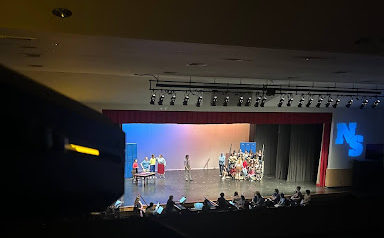Families come out in droves to watch their children or grandchildren perform in Leesville plays and musicals. But most watchers have no idea how hard the performers or the multiple tech crews work.
The hours the technical crews put in span anywhere from 10 hours to 80 hours during show week. For example, I have been working after school for six and a half hours for the past two weeks. On Saturdays, we work from 9 am to 8 pm or 10 am to 9 pm which is an additional ten to twelve hours depending on the day. Sundays are the only days for the past two weeks where I haven’t been in the booth or helping with the run-throughs and dress rehearsals.
These hours are just the beginning. Other crews such as costumes have to stay late to make sure all the costumes are returned from the actors and to their correct places. Additionally shifting crews stay late to practice and perfect the quick changing scenes.
The running crew consists of all the students behind the scenes who help on the day of the show, such as the shifters who move the furniture in and between scenes. They tend to blend into the background and on show days wear all black including their shoes.
Shifters are the most unseen and underappreciated part of the shows. They often do not get to come out for bows and have to remain unknown. The shifters for the current 2024 spring musical, Mean Girls, is above average at 14, where around 10 is more common. The shifters were also recruited from other crews such as paint and props to make sure all beds, walls, and chairs end up on stage at the designated time in the designated place.
As well as the running crew, the lights, and soundboards up behind the audience in the booth. They are also unseen, manning the different stage cues to quick-paced timing. Mean Girls has cues from 5 to 850 over the entire 2 hours. All of these cues need to be timed perfectly to music and dialogue.
These cues are managed by the stage managers who call out the number so the boards and light spotlights know their cues. This is all achieved over a headset in the booth. Ishika Verma, our head cue stage manager, junior, communicates with the other stage managers who are in the wings on stage and lets Ishika know the progress of shifters, actors, and the curtain.
Quick changes for hair and costumes often end in minutes to seconds. As well as microphone quick changes that need to be threaded up from underneath the shirt into their microphone belts.
At the end of the show, all the actors bow but only the crew heads bow after the actors behind the scene are kids underneath who don’t get to bow because of timing and spacing reasons. There is only a small percentage on stage of the entire crew you see behind the scenes.
The long hours are often unrecognized unless you are aware or are in technical theater yourself. The amount of work that goes into one show is incredible. I also make sure to clap extra loud when my crew heads walk out on stage because they have put in the hard work.


Leave a Reply